Who was who
30.1.2018PERSONALITIES OF THE IMPERIAL AND THE CATHOLIC LEAGUE ARMY
FERDINAND II HABSBURG, (1578-1637)
Holy Roman Emperor, King of Bohemia and King of Hungary. The son of Charles II, Archduke of Styria and a cousin of Emperors Rudolf II and Mathias, never enjoyed a good reputation in Bohemia. His name is inseparably connected with the White Mountain, and all the hardships that came afterwards.
In contact with people, Ferdinand appeared kind and friendly, rather cheerful and generous. However, he was absolutely uncompromising and intolerant in matters of faith. The Jesuits had a strong influence on Ferdinand, 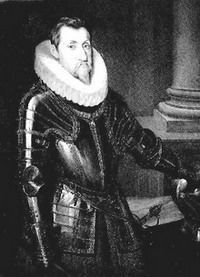 which intensified towards the end of his life. He often doubted his decisions, suffered remorse. He was a man of deep faith rather than of rational calculation. He spent most of the day on religious services and in prayers, but that did not prevent him from devoting time also to his great hobbies, music and horses. In political affairs, however, he acted resolutely and vigorously. In his youth, his mother, Maria Anna of Bavaria, had a decisive influence on him, and it was also her who saw to it that Ferdinand got exclusively Catholic education.
which intensified towards the end of his life. He often doubted his decisions, suffered remorse. He was a man of deep faith rather than of rational calculation. He spent most of the day on religious services and in prayers, but that did not prevent him from devoting time also to his great hobbies, music and horses. In political affairs, however, he acted resolutely and vigorously. In his youth, his mother, Maria Anna of Bavaria, had a decisive influence on him, and it was also her who saw to it that Ferdinand got exclusively Catholic education.
In 1596 Ferdinand took over his father’s rule in Styria, Carinthia and Carniola. Protestants represented great power here as well, but Ferdinand started to persecute them right from the beginning of his rule, and within a few years he completely eradicated the Reformation in his Alpine lands. During the life of Matthias his succession was arranged, and in 1617 Ferdinand was crowned King of Bohemia and shortly afterwards King of Hungary, too.
As the head of militant Spanish-Catholic party at the Viennese court, he greatly contributed to the fact that all available forces were quickly mobilized against the rebellious Czech Estates. In 1619, after the death of Matthias, he was elected Emperor and then crowned in Frankfurt. With the help of Spanish Habsburgs and with the help of the Catholic League, he then won the victory over the insurgents. Cruel punishments waited for the defeated. Both the Czech and Austrian lands were deprived of the liberties of the estates and recatholized hard. He died in Vienna in 1637 and the reign was taken over by his eldest son Ferdinand III.
MAXIMILIAN I, DUke OF BAVARIA, (1573-1651)
Maximilian I, of the House of Wittelsbach. He belonged to the generation which was seriously prepared for their vocation, often by thorough university studies. He was given a strict Catholic education, and his language 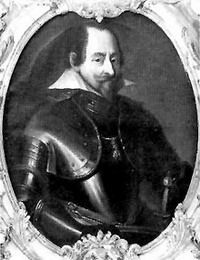 training included the study of Czech.
training included the study of Czech.
As an independent ruler he carried out a financial reform in the country, he limited the power of the estates, and in ten years he raised Bavaria to an unprecedented level. He became the absolute ruler and the most influencial Catholic prince in the Empire. The expression of Bavaria’s power aspirations was the creation of the Catholic League, which was established by Maximilian’s initiative and under his leadership. The Bavarian Duke entered the field of international politics through it. The moment the League joined with its troops the side of the Imperial army against the rebellious Czech Estates, the preponderance of weapons moved to the Catholic side.
Maximilian became the head of the Imperial and the Catholic League army as its commander-in-chief. Although without military experience, despite the objections of Marshal Buquoy, he led the troops to the decisive battle with the Czech Estates. He considered the victory at White Mountain his triumph, and in other battles he contributed to the complete defeat of his relative, Frederick of the Palatinate. He considerably expanded his dominion and in 1623 he received from the Emperor the desired title of Prince-elector, which was taken away from Frederick. He died after almost fifty years of rule in 1651 in Ingolstadt.
CHARLES BONAVENTURE DE LONGUEVAL, COUNT OF BUQUOY, BARON DE VAUX, (1571-1621)
He came from Arras in Northern France and served as a soldier in several Catholic armies. He was a member of the family whose ancestors served the Burgundian dukes and the Spanish crown. In 1602 he was already General – the General of the artillery in the Spanish army, in 1613 he became a governor of Hainaut in today’s Belgium.
In 1618 he came at the call of Emperor Matthias to Vienna so as to become, in the rank of Marshal, the commander-in-chief of the Imperial army. Furthermore, he was appointed Imperial secret councelor and a member of the Court War Council. During the campaign of 1620 he only reluctantly submitted to the command of Maximilian Bavarian, as a pupil of the Spanish school he led the war in a defensive way, and he also used this tactics at the head of the Imperial troops – he followed the principle that a man has to march into battle cautiously and with lead legs. Therefore he did not agree with many critics at the Viennese court, nor with Maximilian who hurried to fight the decisive battle with the Czech troops before the winter. However, in the War Council Buquoy eventually voted for the battle near Prague. As a reward, Marshal Buquoy received from the Emperor the castles Nové Hrady and Rožmberk in Southern Bohemia.
In personal contact he was friendly, loved splendour, surrounded himself with the staff of officers from leading European families. Otherwise he was temperate, he did not avoid life in the field, and he slept in a simple tent among his soldiers, who he was very popular with. In his army there was rather loose discipline, and it was a bigger disaster for the Bohemian regions than the strictly led Catholic League troops. Buquoy was always a model of courage in the fight. After the Battle of White Mountain the Emperor sent him to Hungary against Bethlen where the imperial General succeeded in fighting off the enemy troops, but on 10 June 1621 he was killed during the siege of Nové Zámky.
JOHANN TSERCLAES, COUNT OF TILLY, (1559-1632)
The commander of the Catholic League army, he also belongs to the well-known commanders of the Thirty Years’ War. Like many of the high officers of the Catholic as well as Protestant camp, in his youth he gained his 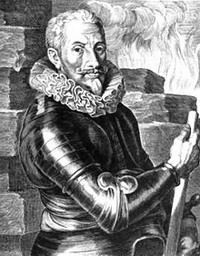 military experience during the fights in the Netherlands and then in Hungary in the war against the Turks. There he acquired the rank of General in imperial service in 1604. Later he went to the services of the Catholic League and commanded the Bavarian army. He was trained in Spanish infantry tactics, until then the best in Europe, and he successfully used it in the years to come.
military experience during the fights in the Netherlands and then in Hungary in the war against the Turks. There he acquired the rank of General in imperial service in 1604. Later he went to the services of the Catholic League and commanded the Bavarian army. He was trained in Spanish infantry tactics, until then the best in Europe, and he successfully used it in the years to come.
He had a decisive role in the victory at the Battle of White Mountain. He differed from other soldiers of his time by firm moral principles and almost ascetic way of life. He put above all his deep faith, bordering nearly on religious fanaticism. In this respect, he complemented well with his superior, Duke Maximilian of Bavaria.
In the following years, he participated in the war in the Palatinate where he clashed with Mansfeld, then he fought in the Danish War and in 1626 he defeated the Danish King Christian IV. After Sweden entered the war he conquered Magdeburg, however, shortly afterwards he was defeated by Gustav Adolph in the battle near Leipzig. He was unable to stop the massive offensive of the Swedish troops, and in 1632 he suffered his last defeat at Kain on the river Lech where he lost his life.
GOTTFRIED HEINRICH, COUNT von PAPPENHEIM, (1594-1632)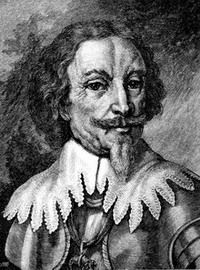
Imperial General and a famous commander of the Thirty Years’ War. Originally a Protestant who converted to the Catholic faith in 1614. He served in the army of the Polish King Sigismund III Vasa and fought in its ranks in Russia. Then he entered the army of the Catholic League and in 1620 he came to Bohemia at the head of the regiment of cuirassiers.
The violent attack of Pappenheim’s cavalry against the right wing of the Czech army helped the victory of the Catholic army. Pappenheim himself was badly wounded in the battle, he sustained about twenty wounds and was found on the battlefield only the next day. In 1623 he went over to the Imperial army and commanded the cavalry regiment where he got famous under the command of Albrecht of Wallenstein and the Pappenheims soon became renowned. He participated with his regiment in the fighting in Lombardy, he fought against the Danes in Lower Saxony. In November 1612, at the battle between Gustav Adolph and Wallenstein at Lützen, Pappenheim came to help the Emperor at the very moment when the victory inclined to the Swedish side. However, he was severely wounded, taken to Leipzig, where he succumbed to his injuries.
ALBRECHT WENZEL EUSEBIUS VON WALLENSTEIN, (1584-1634)
A member of one of the family branches of old Czech nobility settled in Moravia. From 1615 Colonel in the service of the Moravian Estates. He was raised in the Czech Brethren faith, but in 1606 he converted to Catholicism. He gained his military experience in Hungary in 1604.
At the beginning of the war conflict between the Emperor and the Czech Estates, he recruited an infantry regiment for the Moravian Estates. However, in August 1618 he also offered his services to Emperor Ferdinand II and hired for him a Dutch regiment of cuirassiers.Thus he had been given the patent of Colonel from the Emperor before he completed the betrayal on the Moravian Estates by his escape to Vienna. Wallenstein’s regiment arrived from the Netherlands under the command of Lieutenant Colonel de la Motte sometime in the middle of May, at a time when Wallenstein tried to transfer the Moravian infantry regiment to the Emperor. At the battle of Záblatí Wallenstein’s cuirassiers formed a whole fifth of Buquoy’s corps. He was there when the joined troops of the Emperor and the Catholic League started the campaign to Bohemia. His regiment reached the White Mountain plain where it took part in the battle under de la Motte. However, Wallenstein himself was missing on the battlefield, at that time he led a punitive expedition against rebellious towns in North-west Bohemia.
The victory of the Catholics at White Mountain was a stepping stone for him and the beginning of an amazing career. He became a successful military leader, warlord, Duke of Friedland and generalissimo of imperial troops. Wealth and power eventually brought disaster upon him when he was murdered on the Emperor’s instructions by his own soldiers on 25 February 1634 in Cheb.
PERSONALITIES ON THE CZECH SIDE
FREDERICK V OF THE PALATINATE, (1596-1632)
Elector Palatine and Czech “Winter King”.
The young Elector Palatine Frederick V was drawn into the great conflict utterly unexpectedly. He was fourteen years old when he was orphaned and in 1610 after the death of his father, Frederick IV, he became the Elector 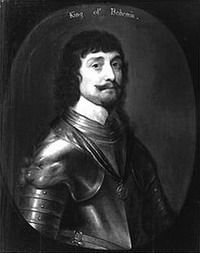 Palatine of the Rhine. Logically, he was predestined to become the head of the Protestant Union after his father and continue with his policy. The protestant John II, the Duke of Zweibrücken, became his guardian. Protestant princes also chose the bride for him, in February 1613 Frederick married in London the equally old Princess Elizabeth, the daughter of the English King James I. On the day of his seventeenth birthday, 26 August 1613, Frederick was declared an adult.
Palatine of the Rhine. Logically, he was predestined to become the head of the Protestant Union after his father and continue with his policy. The protestant John II, the Duke of Zweibrücken, became his guardian. Protestant princes also chose the bride for him, in February 1613 Frederick married in London the equally old Princess Elizabeth, the daughter of the English King James I. On the day of his seventeenth birthday, 26 August 1613, Frederick was declared an adult.
In the autumn of 1619 Frederick accepted the offered Czech crown after some hesitation, having ignored the warning of his father-in-law James I. At the end of October 1619 he moved to Prague and left it hastily on 9 November 1620, never to return there again. Due to his short rule in Bohemia he got a derogatory nickname “the Winter King”.
Frederick was an uncomplicated nature, and he did not have the qualities expected of a good sovereign. He missed the sense of reality, and many times he did not assess his options and overestimated his own strength. His councellors and ministers were able to control him, because in many things he did not have a clear opinion. In Bohemia, the slim and well-built king made a very pleasant impression, and he surprised by his kindness and politeness. He dressed himself expensively and fashionably, he liked celebrations and entertainment.
On 22 January 1621 Frederick was placed under the imperial ban. The Protestant Union, at the head of which he was, broke up in the spring of the same year. Bavarian General Tilly conquered the capital of the Rhenish Palatinate in 1622, and Frederick eventually became an outlaw. In 1623 the Emperor transferred the title of Elector to Maximilian of Bavaria. Frederick succumbed to typhoid infection in Mainz in 1632.
CHRISTIAN I, PRINCE OF ANHALT-BERNBURG, (1568-1630)
The commander-in-chief of the Czech army. A member of the Bernburg line of the imperial family of princes of Anhalt. He became a major protestant diplomat of his time, but he was not very successful in his military career.
In 1591 he led the German Protestant Military Corps to help the French King Henry IV. He made personal contacts with the King and representatives of the French Huguenots. Then he entered the services of the Elector Palatine Frederick IV, who entrusted him with the office of the governor in the Upper Palatinate. As an avowed enemy of the Habsburgs, he developed his indisputable diplomatic talent to break their domination in the Empire. With King Henry IV he prepared the foundation of the Protestant Union and became one of its leaders. He helped create the policy of the young Elector Frederick V. He belonged to the politicians who promoted his candidacy for the Czech throne. As a reward, in 1619 he was appointed Commander-in-chief of the Czech army and led it to the defeat at White Mountain.
After the escape from Prague, he was placed under the imperial ban and therefore Anhalt had to withdraw first to Sweden and then to Denmark. In 1624 the Emperor granted a pardon to him and Christian of Anhalt could return to his Bernburg estate where he lived aside political and military events. His son and successor Christian II participated in the Battle of White Mountain, too.
count georg Friedrich von HOHENLOHE, (1569-1649)
General of the Czech Estates’ army, a member of the imperial estates counts family. As a commander he gained his first war experience in the troops of King Henry IV in France. He fought in England, the Netherlands, then he entered the imperial services in the war against the Turks, where he gained recognition of Emperor Rudolph II and military glory.
His appointment as General of the Czech Estates’ army in 1618 was unexpected and it took place by the intercession of the Palatinate. During the war, however, it turned out that his reputation of the commander was not so much justified. He was unpopular in Bohemia, especially his greed incurred large displeasure here. In 1620, at the time of the greatest difficulties of the Czech army, he claimed damages in the amount of twenty thousand florins for the fact that due to his participation in the Estates Uprising he lost the Emperor’s favour and his pension as well.
After the defeat at White Mountain he fled, but after some time Ferdinand II granted a pardon to him. He withdrew to his estates in Franconia and stopped dealing with politics and military affairs. He outlived all his fellow combatants and died at the venerable age of eighty years.
Peter ernst, count von mansfeld, (1580-1627)
One of the most famous commanders of the Thirty Years’ War served in the Imperial army in Hungary from 1603, in the personal unit of Archduke Matthias. Due to an affair that ended in a duel, he had to leave the service and returned to the Netherlands. Governor General, Archduke Albert, entrusted him with the command of the regiment, at the head of which he distinguished himself many times in combat. After the ceasefire with the Dutch General Estates, he was accepted with the rank of Colonel into the services of the Duke of Savoy, Charles Emmanuel. He transfered him through the Protestant Union to the Czech Estates in 1618. After conquering Pilsen, Mansfeld made this city a base of his troops, which he only reluctantly left.
He was a type of condottiere with rich military experience. Among the commanders of the Czech army he was indisputably the most capable. He retained Pilsen even after the White Mountain and remained faithful to Frederick Palatine in the next phase of the war. Then he went to the service of the Danish King Christian I and fought with Wallenstein who defeated him at the Battle of Dessau Bridge in 1626. His contemporaries thought poorly of Mansfeld’s character. He was accused of dishonesty, dirty financial machinations and treachery. He died in 1627 in the territory of Bosnia when he took a roundabout way through the Balkans to Venice.
CHristian II, prince of anhalt-bernburg, (1599-1656)
The eldest son of Prince Christian I of Anhalt. After his father’s death in 1630 he became the ruling Prince Christian II. At the age of twenty-one he took part in the Battle of White Mountain where he commanded the regiment of arquebusiers in the centre of the Czech battle formation. He led the attack of his regiment with youthful verve and great bravado, but he was wounded and captured together with most of the regiment. Then he was held at the Imperial Court in Vienna. He is the author of the French written memoirs, depicting the course of the battle and his capture.
count jindrich matyas thurn-valsassina, (1567-1640)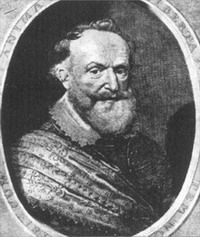
One of the main leaders of the Czech Estates Uprising and the commanders of the Estates army. A Lutheran whose family came from Northern Italy, he himself settled in Bohemia only in 1605. In his youth he travelled a lot and he got as far as the Orient.
As Commander of the imperial cavalry regiment he fought against the Turks. In 1607 he left the Imperial army and in 1609 he recruited the troops in the service of the Czech Estates. He was wounded several times in the fighting. He was one of those who disagreed with the succession of Ferdinand Habsburg on the Czech throne and that is why he lost the lucrative office of the Karlstein burgrave. This even exacerbated his hostile relationship to Habsburgs and brought him to the forefront of the Estates’ opposition. After the Prague defenestration he belonged to the most active and he was fully involved in the uprising.
He was a commander of the army. He surpassed the others by his fervour for the matter of Estates and also by his temperament, noisiness, impulsive behaviour and verbiage. However, he never learned Czech properly. He belonged to the radicals, but he did not show a great political insight or extraordinary commanding skills. He did not slacken in the anti-Habsburg resistance even after the defeat at White Mountain. He fled along with King Frederick, served the Venetians, the Danes, and eventually entered the Swedish service. The Habsburgs always considered him the most dangerous rebel. And he remained so until the end of his life. He died at the age of seventy-three in Livonia.
joachim andreas von schlick, count of passaun and weisskirchen, (1569-1621)
The Schlicks were a rich noble family formed by several family lines. Joachim Andreas belonged to the Jachymov branch, which owned numerous estates in western and northwestern Bohemia. He studied at the university of Jena, where he held the office of rector, his cavalier education was completed by a long-term stay at the Saxon Court in Dresden.
After returning to Bohemia, he ranked among the main leaders of the non-Catholic opposition. Besides Václav Budovec he takes main credit for the creation of Rudolph’s Letter of Majesty. He was a skilful diplomat with a tendency to moderate solutions to political and religious problems. As the head of Czech Lutherans he belonged to the supporters of Saxon politics. With his conciliatory attitude at the diet he caused that in 1617 Ferdinand of Styria was accepted as the King of Bohemia, which he was often blamed for. After the defenestration he was elected one of the directors of the nobility estate. He zealously participated in diplomatic negotiations with allies of the Czech Estates, however, his political prestige suffered due to the election of Frederick of the Palatinate. The election took place during his diplomatic journey to Saxony, which was probably a premeditated move of the Palatine party led by Budovec. Under Frederick he applied for the office of supreme chancellor, but he only attained the office of the supreme land judge.
At the time of the battle of White Mountain he commanded auxiliary troops in Silesia. And after the defeat he retired to Lusatia where he sought protection at the Elector of Saxony. In May 1621 he handed him over to the Emperor and on 21 June 1621 he was executed at the Old Town Square in Prague as the first of twenty-seven.